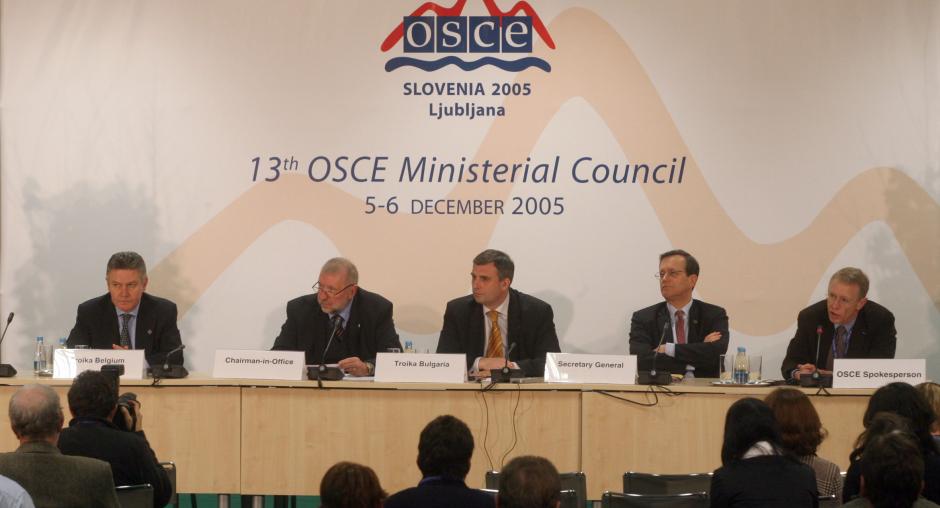OSCE Chairman-in-Office says participating States have "no free ride" on adhering to their commitments

LJUBLJANA, 6 December 2005 - Closing the 13th Ministerial Council of the OSCE on Tuesday, the Chairman-in-Office, Slovenian Foreign Minister Dimitrij Rupel, reminded States that they could not expect "a free ride" when it came to living up to the responsibilities they have committed themselves to upholding.
Delivering a Chairman's closing statement, he said that while there was some natural disappointment that the meeting failed to reach consensus on a Ministerial Declaration, it had been possible to agree on over 20 important decisions. These included statements on the OSCE's role in solving disputes in the southern Caucasus, specifically in Georgia and the Nagorno-Karabakh area.
"The OSCE remains a vital organization in many respects, and one which will continue to stand as a beacon of hope for those living in desperate political and social conditions. From Vancouver to Vladivostok, our citizens turn to the OSCE for answers; in some cases this is their preferred address or even their only address", he said.
"There is no excuse for systematic failure to live up to the responsibilities to which we've committed ourselves. OSCE participation cannot be a free ride. It's above all an effort at sharing responsibilities and commitments. Tolerating grave breaches undermines the credibility of the OSCE in the eyes of those who count on us most - namely, our citizens. If we lose their ear and their trust, I am afraid we've lost our cause and purpose."
The Chairman-in-Office said that the decision on strengthening the effectiveness of the OSCE, along with a "road map" for improving the sense of common purpose among the 55 States was one of the best achievements of the meeting.
"We have agreed on a roadmap for reform, which is extremely important for the future of this Organization, we have new scales of contribution and a capable Secretary General in place. This is all good news," he added.
He said the debate had been open, frank and, he believed, positive: "Two long days and nights of interesting statements and tough negotiations are behind us. We have reaffirmed our commitments, underlined the relevance of the OSCE, and taken steps to strengthen its effectiveness."
The Slovenian Foreign Minister said he was personally disappointed a statement on the future of Kosovo had not been agreed: "South-eastern Europe has been a high priority for me as Chairman-in-Office. This region is a primary example of why this Organization continues to hold added value. However, the OSCE should continue its long-term engagement in Kosovo, building on its recognized expertise in the field of institution- and democracy-building."
Although he welcomed the agreement reached between Georgia and the Russian Federation on the gradual running down of military bases, he said it was unfortunate that, after six years, the OSCE was still debating the 1999 Istanbul Commitments on the withdrawal of Russian forces from Moldova.
However, he praised the OSCE as being, above all, a practical organization and an organization of values and principles: "It is our common values which unite us and our common commitments which make a difference to those who have entrusted us with this job. We will only remain relevant if we can continue to help our citizens help themselves.
"We must broaden the zone of human security. Expanding this zone is our common obligation and highest priority. Democratic capital and economic prosperity will come on the backbone of human security.
Looking back on Slovenia's Chairmanship year Minister Rupel said he had witnessed progress in many countries, in terms of leaders genuinely working to find ways to increase human security.
"Other instances were far less encouraging. I remain worried about the back-pedalling on reforms in Uzbekistan. We should as soon as possible find ways to work with our Uzbek partners to narrow the divide which currently stands between us. The OSCE remains a vital channel of communication."
Turning to next year, when Belgium will take over the Chairmanship, he said there would be a real opportunity to capitalize on the groundwork made this year in Kyrgyzstan, Azerbaijan, Nagorno-Karabakh, and in Georgia.
There would also be a number of key elections in the OSCE area next year. He praised the role of the OSCE's Office for Democratic Institutions and Human Rights: "Elections are the litmus test of democracy. The OSCE has a well deserved reputation of election expertise, and this needs to be preserved and enhanced if possible."
He added that Spain would join the OSCE Troika on 1 January in preparation for its Chairmanship of the OSCE in 2007, with Finland now accepted as Chairman for 2008.
